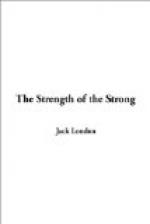“The paper?”
“Yes, sir, it was delivered, but it was the only thing, and it is the last time, too. There won’t be any paper to-morrow. The paper says so. Can I send out and get you some condensed milk?”
I shook my head, accepted the coffee black, and spread open the paper. The headlines explained everything—explained too much, in fact, for the lengths of pessimism to which the journal went were ridiculous. A general strike, it said, had been called all over the United States; and most foreboding anxieties were expressed concerning the provisioning of the great cities.
I read on hastily, skimming much and remembering much of labour troubles in the past. For a generation the general strike had been the dream of organized labour, which dream had arisen originally in the mind of Debs, one of the great labour leaders of thirty years before. I recollected that in my young college-settlement days I had even written an article on the subject for one of the magazines and that I had entitled it “The Dream of Debs.” And I must confess that I had treated the idea very cavalierly and academically as a dream and nothing more. Time and the world had rolled on, Gompers was gone, the American Federation of Labour was gone, and gone was Debs with all his wild revolutionary ideas; but the dream had persisted, and here it was at last realized in fact. But I laughed, as I read, at the journal’s gloomy outlook. I knew better. I had seen organized labour worsted in too many conflicts. It would be a matter only of days when the thing would be settled. This was a national strike, and it wouldn’t take the Government long to break it.
I threw the paper down and proceeded to dress. It would certainly be interesting to be out in the streets of San Francisco when not a wheel was turning and the whole city was taking an enforced vacation.
“I beg your pardon, sir,” Brown said, as he handed me my cigar-case, “but Mr. Harmmed has asked to see you before you go out.”
“Send him in right away,” I answered.
Harmmed was the butler. When he entered I could see he was labouring under controlled excitement. He came at once to the point.
“What shall I do, sir? There will be needed provisions, and the delivery drivers are on strike. And the electricity is shut off—I guess they’re on strike, too.”
“Are the shops open?” I asked.
“Only the small ones, sir. The retail clerks are out, and the big ones can’t open; but the owners and their families are running the little ones themselves.”
“Then take the machine,” I said, “and go the rounds and make your purchases. Buy plenty of everything you need or may need. Get a box of candles—no, get half-a-dozen boxes. And, when you’re done, tell Harrison to bring the machine around to the club for me—not later than eleven.”
Harmmed shook his head gravely. “Mr. Harrison has struck along with the Chauffeurs’ Union, and I don’t know how to run the machine myself.”




